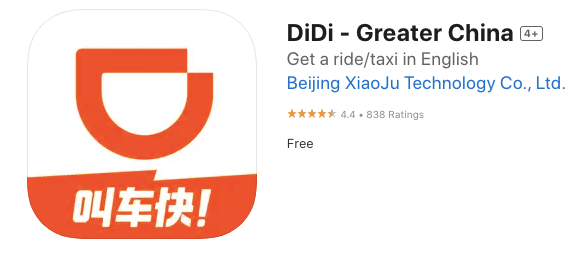(Last updated January 2024)
Many people wonder if Uber or Lyft operates in China, so here is your answer! It’s a wild story, but ultimately, the answer is NO; that said, Uber used to be here. So, what should you use to get around China instead? Read on (or scroll down) to find out!

Uber in Washington, D.C.: Summer 2014
I still remember the first time I used Uber in the US: it was a rainy night in 2015, and I was studying at the Library of Congress in Washington and decided to go out with some new friends from the program. When we prepared to leave the hotel my new colleagues and I were staying at, a teacher a few years younger than me told me to download the app and helped me figure out how to use it (I was young myself then, but this was cutting-edge technology at the time ;-)).
Then, voilà! A nice black car pulled up (this was 2014, when perhaps that’s the only kind of car that they offered?). We were whisked away to our destination, and I became accustomed to using the service before leaving for China in August.

Uber in Beijing, China: Autumn 2014
My first experience in Beijing, during the brief window in which Uber operated there, was quite different.
At the time, “black taxis” were still common in China. They were a risky proposition; getting into a random black car with a driver meant few of the legal protections afforded by taxis or what people use today. You might be taken on a long journey to reach a nearby destination and charged five times the price, for example.
I knew this but was so comfortable (and in fact enveloped in a kind of braggadocio, excited to show my new colleagues how to use Uber) that when I ordered an Uber and a black car pulled up, I got in immediately, failing to check the license plate like an idiot.

As I opened the door, another black car pulled up behind the one I was entering and began to lay in on his horn like a fiend. With a sudden start, I realized that I had almost gotten into the wrong car!
And thus concluded my experiences with Uber in China. While the correct driver did a good job at getting my attention, it shook me to think I’d almost gotten into a random car. I stuck to taxis and the (excellent) metro after that.
Uber Today: Nonexistent in China, 2018+
When I returned in 2018, Uber had failed; it tried to use the same predatory practices here that they had used to dominate Lyft and disenfranchise US taxis, but it failed miserably. Chinese drivers beat them at their own game in a fun tale you can hear here (about 25 minutes in). As a result, after a long, drawn-out fight, Uber slunk away. Unfortunately, taxis still occasionally charged extra fees, refused foreign customers or pretended not to understand when I would ask them to go a place in Chinese. (To be fair, since foreigners are less common here than other countries, it can be hard to see past the unfamiliar face and listen to the Chinese, not to mention the fact that there are also many foreigners who never bother to learn Chinese to begin with, and Chinese taxi drivers have no desire to learn it).

Uber Replacements: Didi, Gaode, & Taxis Ordered through Meituan & Alipay
So what remains? Something better! Didi in English has excellent customer service and offers several levels of service, but still charges less than Uber did. It also lets you order taxis, and if they overcharge, you can complain directly to Didi’s customer service and often get a coupon (though they won’t directly penalize the driver).
After some customers were harmed in the late 2010’s, similar to Uber and Lyft, Didi developed extensive security protocols to protect customers. In general, China is far safer than the US due to the cameras everywhere and severe penalties for violent crime, so please don’t mistake the past issues for present danger. (In fact, due to the “bubble” effect of the Zero COVID Policy and recent tales about Chinese people being tricked into slavery abroad, as well as the frequent reports of gun violence in the US, some local citizens now think it’s safer to remain in China. I had several high school students ask me seriously when I taught high school if I thought US college campuses were safe enough to attend due to past mass shootings.) When it comes to day-to-day physical safety, I am far more comfortable taking a Didi late at night than I am elsewhere.
When you sign up, you can designate an emergency contact, and you can even set an alert for that person to receive notifications when you travel after a certain time. It’s a great idea to get a local friend’s number if you live here and add it so that they know when you leave and get home, particularly if you tend to stay out late. (I’ll do a more in depth post about Didi later, but it’s important to know that when they had the security issues, they responded aggressively and even shut down their late night service for a week while getting “all their ducks in a row.” Now, the most important thing for inebriated drivers to do is to make sure that they don’t accidentally call the police from the app–not that I’m speaking from experience! *Ahem*).
In addition to Didi English, you can use Meituan, Alipay and a myriad of other more general apps. “Mini-programs” in which separate companies pay a fee to have their apps made available within the more popular Chinese apps are common, so even if you don’t have a specific app, you can hail taxis through Meituan, Alipay et al. An honorable mention goes to GaoDe Ditu (ditu, or 地图,is Chinese for “map”), an all-Chinese app that typically hails a cab or assigns a driver much faster than Didi; you just need to be comfortable translating screenshots with Baidu Fanyi or read Chinese enough to use it.

🚨 Important Tip!
No matter which app you use, the driver will want to confirm the last four digits of your (Chinese?) phone number with you when you get in. This is how they avoid getting the wrong passenger.
Don’t stress; just memorize those four digits, and you’ll be good.
Click here and/or here to read how to say phone numbers in English (basically, it’s the same as normal 1-10, with each digit pronounced separately, except that 1 (“yi,” pron. “ee”) is stated as “yao” (pron. “yow”) to avoid being confused with 7 (“qi,” pron. “chee”).
In Conclusion
I’ve mentioned 2014 and 2018 me, but now, in 2024, what do I use? I prioritize the metro since it beats the terrible traffic, but on less busy days, I use Didi English and Gaode. Try them yourself–see below! (Not affiliate links–just useful to have.)

🔗 RELATED APPS & LINKS:
- More on the Library of Congress & its resources for teachers: https://www.loc.gov/programs/teachers/about-this-program/teachers-in-residence-programs/
Didi English: Didi has a presence outside of China in different forms, so be sure to choose the “Didi: Greater China” app for each i/OS:
- Apple: https://apps.apple.com/us/app/didi-greater-china/id554499054
- Android: (Switch the language setting to English after downloading): https://play.google.com/store/apps/details?id=com.sdu.didi.psnger

- Gaode Ditu (高德地图) app: 高德地图-高德打车,导航公交地铁出行 on the App Store (apple.com)
- On Android/Google Play: https://play.google.com/store/apps/details?id=com.autonavi.minimap
- A sassy, if somewhat outdated, article from Smart Shanghai in 2017 on how to change Didi to English. (Just read the whole thing–they did update it some): https://www.smartshanghai.com/articles/tech/tested-how-to-use-didi-now-that-its-in-english
- An equally-sassy article from 2022 (with screenshots) that explains how to use Didi (thanks to Smart Shanghai for doing the heavy lifting here!): https://www.smartshanghai.com/articles/shanghai-life/how-to-call-a-cab-with-chiness-app-didi-chuxing
- Magnates Media’s Chapter 5: “Uber vs. the World” explains how Uber’s scammy tactics failed here (25 minutes in): https://www.youtube.com/watch?v=ISIjlRExdpE
- Linked articles on Chinese numbers from above: from LTL Language School in Taiwan and Mandarin Portal.
🗞️ Want notified about future posts? Click here to sign up for notifications, and receive a Quick Reference Guide to China free, too!



[…] foreigners with passing ability in Chinese will have the experience of a cabbie or Didi driver asking whether they are married, what their jobs are and how much money they make. At first, such […]